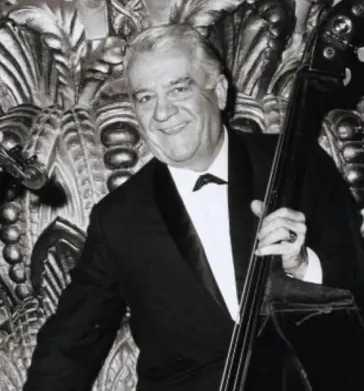
Louis Vola
Instrument: Bass
Who is Louis Vola?
Louis Vola, the French contrabassist, played a pivotal role in the career of the legendary guitarist Django Reinhardt. Despite the challenges presented by Reinhardt’s unpredictable behavior, Vola recognized his exceptional talent and dedicated himself to nurturing and supporting him.
Born on July 6, 1902, in the picturesque Riviera town of La-Seyne-sur-Mer, Vola grew up in a family of Italian shoemakers. He initially began his musical journey playing his father’s accordion and demonstrated proficiency in various instruments. However, it was his exposure to the lively bal musettes that ignited his passion for music. After a brief stint as a baker, Vola turned his attention to the double bass, becoming a full-time musician.
Vola’s association with Django Reinhardt began when he secured Reinhardt’s first engagement with his band at the Palm Beach Casino in Cannes. Despite Reinhardt’s occasional absences and the bustling presence of his numerous “cousins,” Vola recognized the guitarist’s extraordinary talent and believed he was worth the effort and challenges that came with nurturing him.
Throughout his career, Vola played a crucial role in mediating conflicts between Reinhardt and violinist Stéphane Grappelli. However, Vola admitted that their constant squabbles often left him exhausted, confessing that he sometimes contemplated leaving them to sort out their differences on their own.
With the outbreak of World War II, Vola found himself regularly performing with the Ray Ventura Orchestra. When the war forced them to flee to South America, Vola remained there for eight years. Upon his return to Paris, he discovered that the music scene had evolved, leaving him somewhat marginalized. After an unsuccessful venture running a restaurant in Nice, Vola found a home at the Scheherazade, a popular Russian restaurant, where he spent three decades. In jest, he would often say, “My double bass plays by itself.”
Vola’s greatest contribution to music was undoubtedly his discovery and early mentorship of Django Reinhardt. Additionally, he displayed competence as a session musician, collaborating with numerous renowned performers. Despite his limited musical abilities, Vola’s versatility was evident as he not only played bass but also doubled on piano and drums, receiving compensation accordingly.
In the late 1950s, Vola retired to Cachan, where he spent his final years. He passed away in August 1990, leaving behind a lasting legacy as a catalyst in Django Reinhardt’s career and a competent and dedicated musician in his own right.